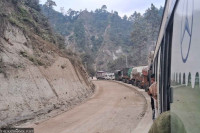Editorial
Trial and failure
Big infrastructure should be prevented from becoming a Damocles sword
The Sikta irrigation project, one of the national pride projects of the country, suffered a major damage on its main canal on Tuesday when the flow of water was tested. Despite the government spending billions on the project, the incident has raised serious questions about the quality of construction. The damage has left the locals worried as it has led to a rise in water level at Jhijhari River in Banke district. They have accused the construction company of using substandard materials while building the canal.
But the Kalika CTCE JB construction company, which was awarded the contract to build the main canal, has asserted that the damage to the canal was normal during testing and was not related to its quality. The company has said that it would rebuild the damaged parts.
Compared to other national pride projects, the Sikta irrigation project is on track for timely completion. The construction of the project, envisioned to supply irrigation facility to 80 percent of farmlands in Banke district, has been going on for the past 13 years and is scheduled to be complete by 2019-20. The construction had so far been moving at a good pace. The latest incident, however, has cast doubt on the quality of the project. Timely completion of the project is indeed important, but low-quality construction can have dire consequences in the future.
In the last two decades, there has been considerable progress in Nepal’s construction industry and many domestic companies are carrying out several important infrastructure projects of the country. But more often than not, the quality of infrastructure has come into question. Indifference to quality is most evident in the sorry state of roads in the country.
The process of awarding infrastructure projects to contractors is problematic. Experts argue that although other factors are considered during the evaluation process, the government practice of awarding the contract to the lowest bidder pushes construction companies to reduce their bids to unprofitable levels. This has a negative impact on both the quality and duration of the projects.
While the bidding process should have an in-built mechanism that guards against compromise in quality, it is equally important to strengthen the government’s inspection procedure. Without a rigorous government inspection regime, contractors will be tempted to cut corners and increase profit margins. The government should also set certain standards for the construction materials used in infrastructure projects. The earthquake last year exposed the vulnerability of not just private homes but also public buildings. Even modern government-owned RCC buildings collapsed in the earthquake affected districts. The collapse of big infrastructure like hydro dams, tunnels or canals can result in a massive loss of life and property.




 6.01°C Kathmandu
6.01°C Kathmandu














